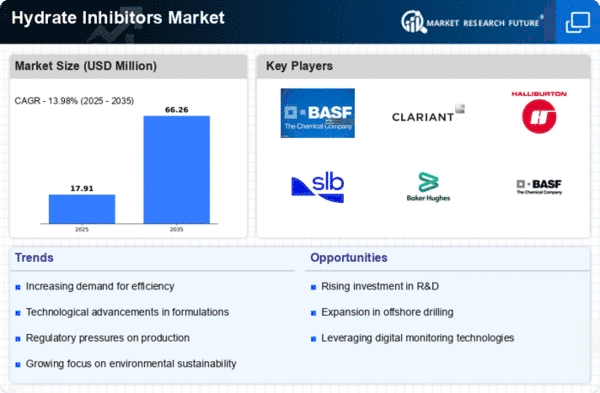Top Industry Leaders in the Hydrate Inhibitors Market

The global hydrate inhibitors market is a dynamic and competitive space, driven by the ever-evolving needs of the oil and gas industry. In recent years, the market has witnessed significant growth, propelled by factors like increasing demand for low-dosage hydrate inhibitors (LDHIs), rising oilfield drilling activities in developing regions, and advancements in extracting natural gas from oceanic hydrate deposits.
Strategies Adopted by Key Players:
-
Product Innovation: Leading companies are actively investing in research and development to enhance the efficacy and environmental sustainability of hydrate inhibitors. This includes developing low-dosage hydrate inhibitors (LDHIs) that offer optimal performance while minimizing environmental impact. -
Strategic Partnerships: Collaborations between players in the oil and gas industry and hydrate inhibitor manufacturers are becoming increasingly common. This allows for sharing of expertise, resources, and infrastructure, facilitating faster development and deployment of advanced hydrate management solutions. -
Geographic Expansion: With the burgeoning oil and gas exploration activities in developing regions, key players are focusing on expanding their market reach into these areas. This involves establishing regional offices, forming partnerships with local companies, and adapting product offerings to specific regional needs. -
Mergers and Acquisitions: Consolidation is a recurring theme in the hydrate inhibitors market, as larger companies seek to acquire smaller players with promising technologies or established market positions. This allows them to expand their product portfolio, access new markets, and achieve economies of scale.
Factors for Market Share Analysis:
-
Product Portfolio: The breadth and depth of a company's hydrate inhibitor portfolio plays a crucial role in market share analysis. Companies with diverse offerings catering to various application segments and operating conditions tend to hold a significant advantage. -
Regional Presence: A strong regional presence is essential for capturing market share in geographically dispersed industries like oil and gas. Companies with established distribution networks and technical support teams in key regions are well-positioned to thrive. -
Brand Reputation: A strong brand reputation built on reliability, quality, and performance is vital for attracting customers in the competitive hydrate inhibitors market. Companies with a proven track record of success and positive customer testimonials gain a significant edge. -
Innovation Capability: The ability to continuously develop innovative products and solutions is crucial for maintaining market share in the rapidly evolving hydrate inhibitors market. Companies that demonstrate a commitment to R&D and technological advancements are likely to stay ahead of the curve.
The growth of the market players is dependent on market and economic conditions, government regulations, and industrial development. Thus, the players should focus on expanding the production capacity, enhancing their services, and innovating in new technology to deliver supplier quality products to meet the demand. Schlumberger Limited (US), Baker Hughes, a GE Company LLC (US), BASF SE (Germany), Halliburton (US), Ecolab (US), Huntsman International LLC (US), Ashland (US), ARKEMA (France), Evonik Industries AG (Germany), Finoric LLC (US), Omni industrial solutions (US), and Tetra Technologies, Inc. (US) are the major companies in the market at the present that are competing in terms of quality, price, and availability.
Recent News
August 2023:
Schlumberger: Launched its new hydrate inhibitor delivery system, IntelliFlow, designed to optimize the performance of hydrate inhibitors and reduce treatment costs. The system utilizes real-time data to optimize the dosage and distribution of inhibitors.
TotalEnergies: Partnered with a leading research institute to develop and commercialize a new class of hydrate inhibitors derived from renewable resources. The project aims to develop more sustainable and environmentally friendly solutions for the oil and gas industry.
July 2023:
Halliburton: Announced the commercial availability of its next-generation kinetic hydrate inhibitor, HydraMax. The company claims it offers longer-lasting protection against hydrate formation and improved compatibility with other production chemicals.
Nalco Champion: Introduced a new generation of low-dosage hydrate inhibitors designed for subsea production systems. The new inhibitors offer improved performance and lower environmental impact compared to existing products.










